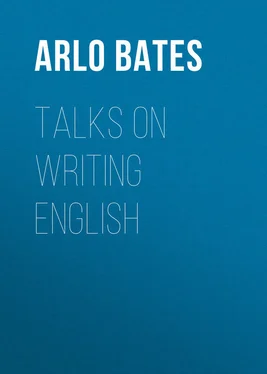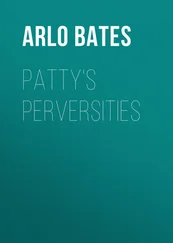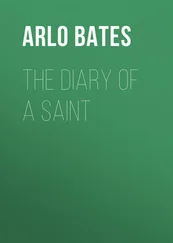Arlo Bates - Talks on Writing English
Здесь есть возможность читать онлайн «Arlo Bates - Talks on Writing English» — ознакомительный отрывок электронной книги совершенно бесплатно, а после прочтения отрывка купить полную версию. В некоторых случаях можно слушать аудио, скачать через торрент в формате fb2 и присутствует краткое содержание. Жанр: foreign_antique, foreign_prose, на английском языке. Описание произведения, (предисловие) а так же отзывы посетителей доступны на портале библиотеки ЛибКат.
- Название:Talks on Writing English
- Автор:
- Жанр:
- Год:неизвестен
- ISBN:нет данных
- Рейтинг книги:5 / 5. Голосов: 1
-
Избранное:Добавить в избранное
- Отзывы:
-
Ваша оценка:
- 100
- 1
- 2
- 3
- 4
- 5
Talks on Writing English: краткое содержание, описание и аннотация
Предлагаем к чтению аннотацию, описание, краткое содержание или предисловие (зависит от того, что написал сам автор книги «Talks on Writing English»). Если вы не нашли необходимую информацию о книге — напишите в комментариях, мы постараемся отыскать её.
Talks on Writing English — читать онлайн ознакомительный отрывок
Ниже представлен текст книги, разбитый по страницам. Система сохранения места последней прочитанной страницы, позволяет с удобством читать онлайн бесплатно книгу «Talks on Writing English», без необходимости каждый раз заново искать на чём Вы остановились. Поставьте закладку, и сможете в любой момент перейти на страницу, на которой закончили чтение.
Интервал:
Закладка:
It requires a more trained perception to feel the variations which result from altering in the following example the position of “only.”
The theory that the poet is a being above the world and apart from it is true of him as an observer only who applies to the phenomena about him the test of a finer and more spiritual sense. – Lowell: Life and Letters of James Gates Percival .
If we say “is true only of him who as an observer,” we shall mean one thing, – and I confess to a suspicion that this is the thing which Lowell intended! – whereas the passage as it stands asserts that the theory is true considering the poet as merely an observer.
It is not necessary to multiply examples. Every student who attempts careful expression will come upon illustrations enough in his own work. The important thing is to be clearly aware of what is to be said, and then to be sure that it is said, and said unmistakably.
In the construction of sentences the coherent arrangement of words is frequently hindered by the grammatical relations; no such limitation prevents the proper placing of sentences in the formation of paragraphs. In the construction of paragraphs, however, even more than in the construction of sentences, is necessary the utmost clearness of ideas. It is here essential to know not only what one has to say, but the relative strength which should be given to each link in the chain of thought. The question of proportion must here have the fullest answer. The relative stress which is to be given by position and the relative stress which is to be imparted by proportion are alike of the greatest importance in the making of the paragraph.
Something of this may be shown by an example. The following is a paragraph from the essay by Jeffrey on “The Characters in Shakespeare’s Plays:” —
Everything in him [Shakespeare] is in unmeasured abundance and unequaled perfection, – but everything so balanced and kept in subordination, as not to jostle or disturb or take the place of another. The most exquisite poetical conceptions, images, and descriptions, are given with such brevity, and introduced with such skill as merely to adorn without loading the sense they accompany… All his excellences, like those of nature herself, are thrown out together; and instead of interfering with, support and recommend each other.
Let this now be read with a transposition of sentences: —
Although in Shakespeare everything is so balanced and kept in subordination as not to jostle or disturb or take the place of another, and is in unequaled perfection, yet everything is in an unmeasured abundance. He gives with such brevity and introduces with such skill as to adorn without loading the sense they accompany, the most exquisite poetical conceptions, images, and descriptions. All his excellences, although they support and recommend instead of interfering with each other, are thrown out together like those of nature herself.
The words and phrases are identical in these two paragraphs, save for the slight alterations and changes of connectives made necessary by transposition; and yet the effect is distinctly different. The first, as Jeffrey intended, remarks that in spite of the great luxuriance of Shakespeare’s work it is always well ordered; the second declares that although well ordered the poet’s work is as luxurious as nature herself.
If the proportion were changed, the effect would be varied again. Cutting out a few clauses from the original, we have: —
Everything in Shakespeare is so balanced and kept in subordination as not to jostle or disturb or take the place of another. The most poetical conceptions are given with such brevity and introduced with such skill as merely to adorn without loading the sense they accompany. All his excellences are thrown out together, and instead of interfering with, support and recommend each other.
Here Shakespeare’s fine ordering of his style is made more emphatic than in the original, and a glance will show how, by the suppression of other phrases, the luxuriance of his work could have been given the more prominence. A writer must know which of many possible shades of meaning is the one which he desires to convey, and he is likely to be successful in his work or the reverse according to the sharpness of his own apprehension of what he is aiming at. The gunner who shuts his eyes when he fires is more likely to hit the mark than is the writer who vaguely endeavors to say something likely to succeed in accurately saying anything.
IV
DETAILS OF DICTION
The student who endeavors to apply to words the tests of Good Use finds himself confronted with some questions which are very easily answered and with others so difficult that even the experts of language may disagree concerning them. It is of course to be supposed that we have all mastered the canons which forbid the use of Barbarisms, Improprieties, and Solecisms, – however much we allow ourselves to be influenced by the newspapers into the habit of violating them. We have not got through our early school years without having our attention called to the difference of effect produced by long and short words. Most of us have had more or less confusing instruction on the subject of the use of Latin words and words which are somewhat inexactly termed Anglo-Saxon. We have all known brief but bewildered intervals during which we endeavored to live up to a noble resolution to make our vocabulary strongly Anglo-Saxon; and we are most of us conscious in our secret hearts that we neither did this ever, nor ever for a moment knew how to set to work to do it.
It is as well for the written language of to-day that there has never been possible a practical revision of the tongue by the dropping of words of Latin origin. It is a most mistaken notion which turns attention to the race origin of words instead of directing study to their actual force in use. It sounds admirably learned to talk of a diction which is too strongly Latin or which is markedly Anglo-Saxon; it is possible enough to see that in general a preponderance of classical words imparts dignity and that an abundance of Saxon gives terseness to a style; but the man who in desiring to secure the one effect or the other goes to work to select his language on this basis is utterly ignoring the very first principles of practical composition. Words are to be chosen with reference to a desired effect, and their pedigree is of no more consequence than is that of the players on a foot-ball team. The boys of one descent may do better than those of another, and words of one or of another derivation may produce a desired effect, – but the contrary may be true, so that such a principle of selection is as absurd in one case as in the other.
Of long and short words much the same might be said. We are pretty well out of the days when it was still needful to insist upon the admonition of Frere: —
And don’t confound the language of the nation
With long-tailed words in osity and ation .
The childish love of fine words which belongs to the infancy of literature is generally outgrown. It is recognized that words are to be selected solely for their effect, and not for extraneous pretensions. In this way is to be made the choice between words general and specific, and of words literal or figurative.
A consideration which is of importance in the choice of words, and one with which we shall be concerned later on, is that of denotation and connotation. A word denotes what it expresses directly; it connotes what it expresses indirectly; it denotes the idea which it names, and connotes the idea that it implies; it denotes what it says, and connotes what it suggests. The word “Washington” denotes a particular man, whose history we know, but with that history go so many suggestions and associations that the name connotes the idea of patriotism, military skill, and devotion to the nation from the very hour of its birth. The word “treason” denotes a specific offense against the government; while it connotes all the shame with which men regard one who betrays his country. In the familiar line of Wordsworth, the words denote a certain common flower beside a stone covered with another common and ordinary vegetable growth; they connote all the beauty of the azure blossom, the sweetness of the springtide, the quietude of a sylvan scene, all those lovely and touching associations which can be expressed only by suggestion. It is in the fact that certain sentiments can be conveyed by indirect means only that the value of connotation lies. To suggest by the choice of words those delicate and subtle ideas which are like a fragrance or like the iridescent sheen of nacre is one of the highest triumphs of literary art; and the nice artist in words is certainly not less careful in regard to the connotation of words than he is of their denotation.
Читать дальшеИнтервал:
Закладка:
Похожие книги на «Talks on Writing English»
Представляем Вашему вниманию похожие книги на «Talks on Writing English» списком для выбора. Мы отобрали схожую по названию и смыслу литературу в надежде предоставить читателям больше вариантов отыскать новые, интересные, ещё непрочитанные произведения.
Обсуждение, отзывы о книге «Talks on Writing English» и просто собственные мнения читателей. Оставьте ваши комментарии, напишите, что Вы думаете о произведении, его смысле или главных героях. Укажите что конкретно понравилось, а что нет, и почему Вы так считаете.












